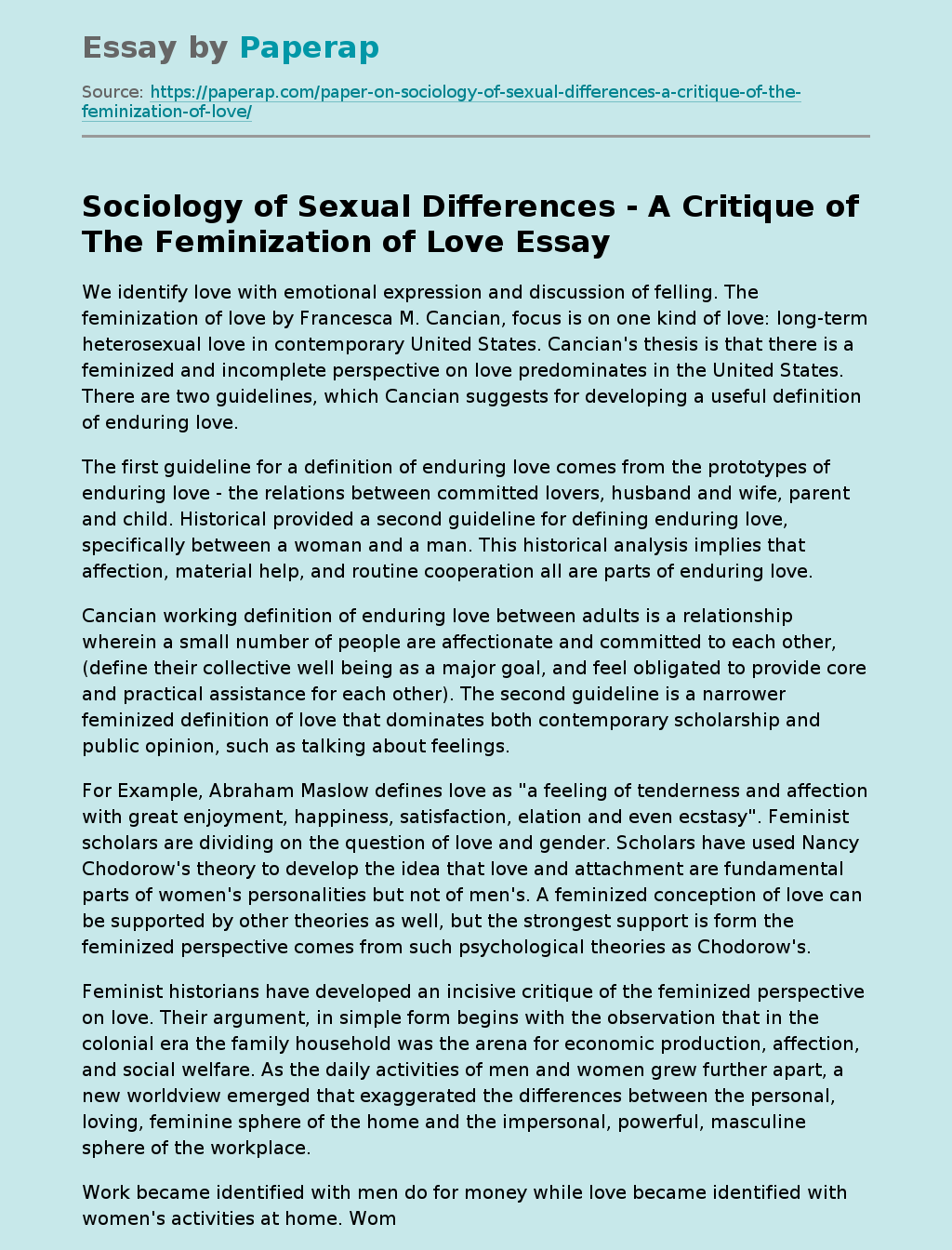Sociology of Sexual Differences - A Critique of The Feminization of Love
We identify love with emotional expression and discussion of felling. The feminization of love by Francesca M. Cancian, focus is on one kind of love: long-term heterosexual love in contemporary United States. Cancian’s thesis is that there is a feminized and incomplete perspective on love predominates in the United States. There are two guidelines, which Cancian suggests for developing a useful definition of enduring love.
The first guideline for a definition of enduring love comes from the prototypes of enduring love – the relations between committed lovers, husband and wife, parent and child.
Historical provided a second guideline for defining enduring love, specifically between a woman and a man. This historical analysis implies that affection, material help, and routine cooperation all are parts of enduring love.
Cancian working definition of enduring love between adults is a relationship wherein a small number of people are affectionate and committed to each other, (define their collective well being as a major goal, and feel obligated to provide core and practical assistance for each other).
The second guideline is a narrower feminized definition of love that dominates both contemporary scholarship and public opinion, such as talking about feelings.
For Example, Abraham Maslow defines love as “a feeling of tenderness and affection with great enjoyment, happiness, satisfaction, elation and even ecstasy”. Feminist scholars are dividing on the question of love and gender. Scholars have used Nancy Chodorow’s theory to develop the idea that love and attachment are fundamental parts of women’s personalities but not of men’s.
A feminized conception of love can be supported by other theories as well, but the strongest support is form the feminized perspective comes from such psychological theories as Chodorow’s.
Feminist historians have developed an incisive critique of the feminized perspective on love. Their argument, in simple form begins with the observation that in the colonial era the family household was the arena for economic production, affection, and social welfare. As the daily activities of men and women grew further apart, a new worldview emerged that exaggerated the differences between the personal, loving, feminine sphere of the home and the impersonal, powerful, masculine sphere of the workplace.
Work became identified with men do for money while love became identified with women’s activities at home. Women are only moderately superior to men at love: they have more close relationships and care more about them, and they seem to be more skilled at love, especially when it involves expressing feeling and being venerable. Men tend to have a distinctive style of love that focuses on practical help, shared physical activities, spending time together and sex.
Here are some negative consequences of the feminization of love: the feminized perspective leads to political and moral problems; it works against some of the key values and goals of feminists and humanists by contributing to the devaluation and exploitation of women; it states that men’s dependency on women remains covert and repressed while women’s dependency on men is overt and exaggerated; the feminized perspective on love reinforces this power differential by leading to the belief that women need love more than men; the feminized perspective love is that it legitimates impersonal, exploitive relation in the workplace and the community; feminization of love intensifies the conflicts over intimacy between women and men in close relationship, finally the feminized perspective on love, childcare is a subtle communication of activities, not work.
In conclusion the material in this article supports the course thesis that ‘gender is socially constructed’. The concept of the sociological imagination supports practically everything in this article. First it talks about history of the past and how things are starting to change. Secondly, the article shows how society plays a role. Finally, the article talks about individuals (men and women) but it does not really explain how they feel. Cancian’s article is very wordy, boring and it jumps around quite a lot. The article made me think of topics I have never really thought about. The author certainly accomplished what she set out to do.
Sociology of Sexual Differences - A Critique of The Feminization of Love. (2017, Oct 24). Retrieved from https://paperap.com/paper-on-sociology-of-sexual-differences-a-critique-of-the-feminization-of-love/

